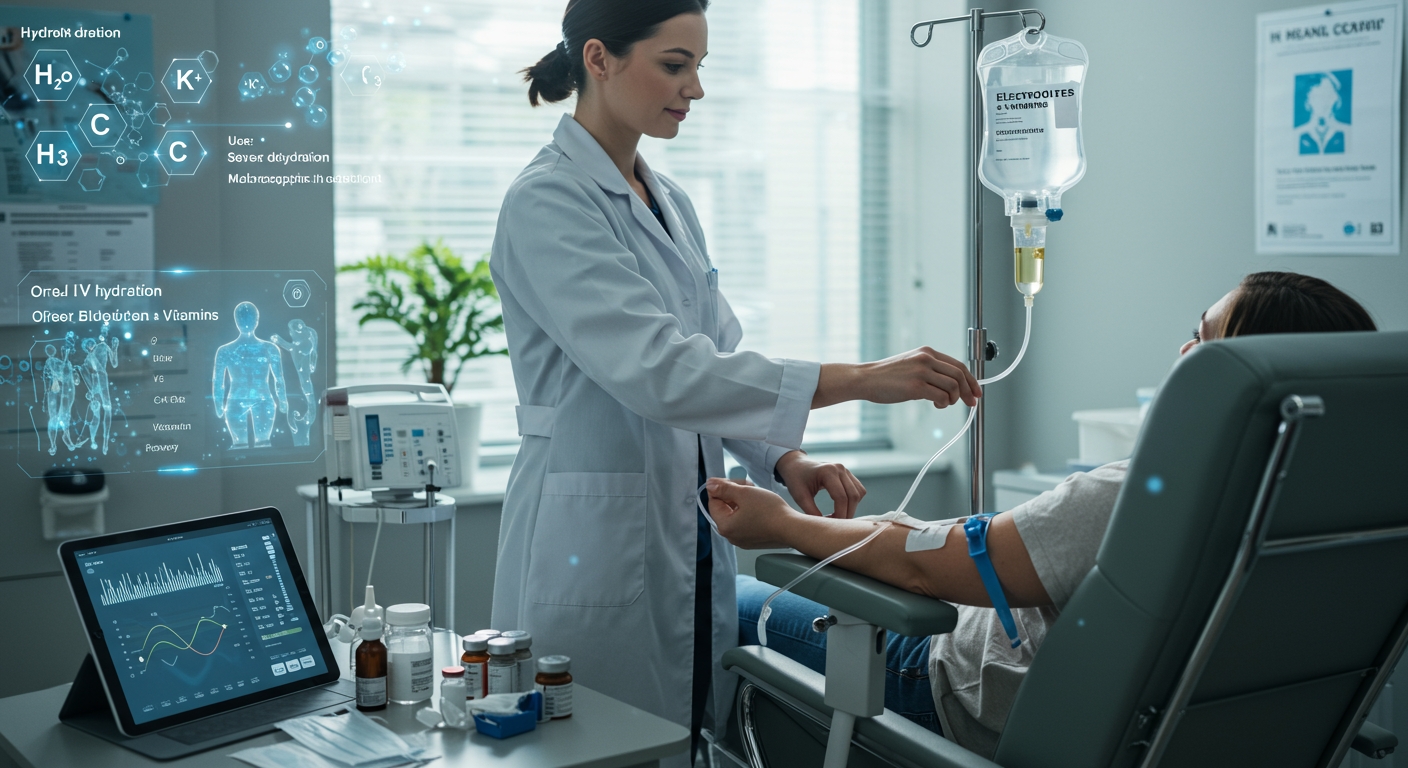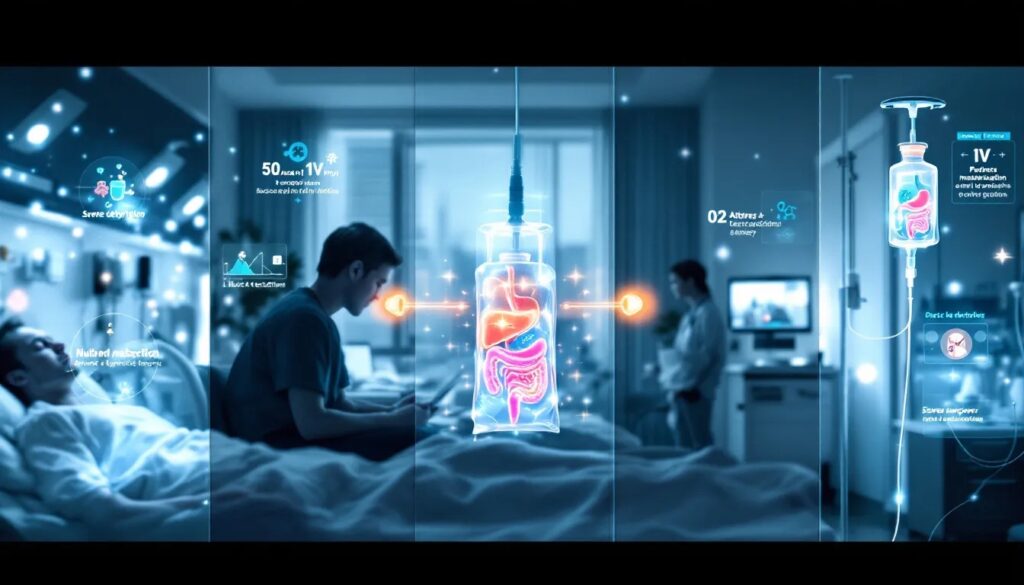Blog
Hydration Matters: Why IV Drip Therapy Is More Than Just a Fad

Dehydration does more than make you thirsty. When your cells lack enough fluid and electrolytes, your energy drops, and your organs work harder.
Many people see celebrities relaxing with an IV drip and assume it is a luxury fad.
In reality, an intravenous drip can serve a serious purpose. It delivers fluids and nutrients directly into your bloodstream, bypassing your digestive system for faster absorption.
This article breaks down why IV hydration deserves attention, when it really helps, and what you should consider before trying it.
In This Article
- What is IV hydration therapy?
- Why do many people think it’s a fad
- When can IV hydration be genuinely useful?
- Real benefits of IV hydration
- Risks and considerations
- Clearing up common questions
- A balanced perspective on IV hydration
What is IV hydration therapy?
An intravenous (IV) drip is simply a bag of sterile fluids connected to a thin tube and needle. The fluids often contain water, electrolytes, and vitamins.
Instead of drinking and waiting for your gut to absorb nutrients, an IV delivers them straight into your blood. This route means your body can use 100 percent of the ingredients because nothing is lost in digestion.
For people with malabsorption problems or chronic illnesses, this direct delivery can correct deficiencies quickly. It’s also why hospitals rely on IVs in emergencies to restore blood volume or deliver medications.
Why do many people think it’s a fad?
The popularity of IV lounges and mobile “drip bars” has exploded. Some businesses market cocktail‑style drips to boost energy, cure hangovers, or beautify skin.
Social media posts of influencers hooked up to IV lines add to the mystique. Yet the scientific evidence behind elective IV vitamin therapy is thin.
A recent review notes that benefits claimed by wellness clinics—such as increased energy or glowing skin—are largely anecdotal and lack well‑designed clinical trials.
Cost is another issue. Sessions often cost hundreds of dollars and are rarely covered by insurance.
Needles and sterile equipment are required, so the procedure must be performed by trained professionals in a sanitary environment.
When you can drink water, eat a balanced diet, and rest to recover from mild dehydration or fatigue, paying for a drip may seem excessive.
When can IV hydration be genuinely useful?
While trendy uses grab headlines, IV hydration has long been a medical tool. Evidence shows it is beneficial in specific situations:
- Severe dehydration: The World Health Organization advises oral rehydration for mild or moderate dehydration but recommends intravenous fluids only for severe cases. This includes dehydration from cholera, prolonged vomiting, or diarrhea that prevents drinking fluids.
- Malabsorption or nutrient deficiencies: People whose digestive systems cannot absorb nutrients well—due to Crohn’s disease, celiac disease, or after surgery—may need IV therapy to replenish vitamins and minerals quickly.
- Medical emergencies and chronic illness: Hospitals use IVs to correct electrolyte imbalances, deliver medications, and support patients who cannot eat or drink.
- Athletes with specific needs: Research on athletes shows that IV prehydration has limited evidence and should be reserved for a subset of fluid‑sensitive competitors in well‑monitored settings. Major sports agencies even restrict routine IV fluid use due to potential performance advantages and doping concerns.
- Severe hangovers or toxin overload: An IV blend can deliver fluids, electrolytes, and anti‑nausea medication faster than oral rehydration. Our hangover IV combines hydrating fluids, vitamins, and antioxidants to replenish what alcohol strips away. The result can be relief from headaches and nausea, helping you get back to normal sooner.
Table: When IV hydration is appropriate
| Situation | Why an IV drip helps |
|---|---|
| Severe dehydration | Oral fluids can’t replace fluids fast enough; IV restores blood volume quickly |
| Nutrient malabsorption | Direct bloodstream delivery bypasses faulty digestion |
| Post-surgery recovery | Supports healing and energy when eating is difficult |
| Fluid-sensitive athletes | May benefit under medical supervision with proper dosing |
| Hangover or toxin build-up | Restores hydration and supports detoxification quickly |
Real benefits of IV hydration
When used appropriately, IV therapy offers several advantages:
- Rapid rehydration: Fluids enter your circulation instantly, improving blood volume and lowering heart strain. This can be vital during severe dehydration or after intense exercise.
- Better nutrient absorption: Vitamins and minerals bypass digestion, reaching tissues at higher concentrations. This is important for individuals with absorption disorders.
- Customizable formulas: Clinicians can tailor drips to include electrolytes, amino acids, antioxidants, or medications to suit specific needs. For example, our IV lounge offers targeted formulas such as immune support, energy boosts, and detox drips. Each blend is formulated by medical professionals and delivered in a sterile clinical environment.
- Athlete recovery: In certain cases, athletes use IVs to restore fluid and electrolyte balance after extreme exertion. Our athlete recovery program provides doctor‑led drips that support muscle recovery and reduce fatigue.
- Symptom relief: IV fluids can ease nausea, headaches, and fatigue during hangovers, migraines, or the flu. Our hangover IV includes anti‑nausea medication and antioxidants to speed relief.
Risks and considerations
IV therapy is not risk‑free. Any invasive procedure carries potential complications:
- Infection and vein damage: Needles must be inserted correctly, and sterile technique is mandatory. Poor hygiene or repeated sessions can lead to phlebitis, bruising or infections.
- Nutrient overload: Delivering high doses of fat‑soluble vitamins (A, D, E, K) directly into the bloodstream can cause toxicity. Electrolyte imbalances or fluid overload may affect heart and kidney function.
- Underlying health conditions: People with heart or kidney disease, pregnant or breastfeeding individuals, should avoid non‑medically necessary IV therapy. Always consult a doctor before treatment.
- Cost and accessibility: Sessions range from $100 to $300, and the benefits for healthy people are often short‑lived. Many claims are anecdotal, and rigorous clinical trials are lacking.
Clearing up common questions
Does an IV drip cure a hangover?
A hangover is largely due to dehydration and inflammation. An IV can rapidly replace fluids and electrolytes, and some people feel better quickly.
However, experts note that drinking water, resting, and taking over‑the‑counter medication is cheaper and often just as effective for mild hangovers.
Our hangover IV is best reserved for people who need to recover fast for work or travel.
Is IV therapy safe for athletes?
For most athletes, standard hydration and nutrition are sufficient. A review of intravenous fluid use in sport found limited evidence supporting routine IV prehydration and recommended reserving it for specific cases under medical supervision.
Additionally, some sports organizations restrict IV use because it may confer an unfair advantage. Athletes considering IV therapy should consult with a sports medicine doctor.
Can I get an IV at a spa or home service?
You should be cautious about IV bars and mobile services. Many operate outside of medical facilities.
As the CU Anschutz experts explain, if you seek a drip for non‑medical reasons, verify that trained professionals administer it, the equipment is sterile, and your health is assessed.
For severe dehydration or illness, you should go through standard healthcare channels.
A balanced perspective on IV hydration
IV therapy has been used in hospitals for nearly a century because it works well for medical conditions requiring rapid fluid or nutrient delivery.
When you are severely dehydrated, unable to absorb nutrients, or recovering from surgery, an IV drip can be lifesaving.
New wellness applications—boosting energy, curing hangovers, or improving skin—are popular but not strongly supported by research.
Limited evidence suggests benefits for a subset of athletes, but routine use for sports performance is not recommended.
At LIVV Natural, we believe in using IV therapy responsibly. Our doctor‑led team evaluates each client’s health, goals, and medical history before recommending a drip.

